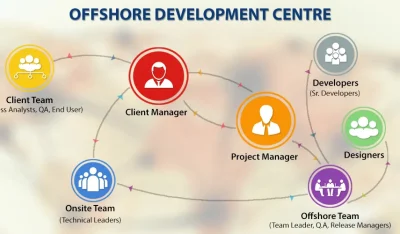- Home
- >
- Offshore News
- >
- 7 Tips to Embrace Cultural Differences with Offshore Teams
Let’s say you’re part of a team that spans countries, cultures, and time zones. You have the opportunity to work with bright and diverse professionals. Not to mention the different backgrounds and different viewpoints. You could save money and time by outsourcing some tasks to your team members abroad. Isn’t that a great opportunity?
But what if you also have to struggle with communication barriers, misunderstandings, conflicts, and Cultural Differences with Offshore Teams? What if you fail to align your expectations, goals, and processes with your team members abroad?
In this blog post, we will talk about how cultural differences with offshore teams are likely to impact overall performance and fulfillment. Ready to learn how to resolve cultural differences? Then read on!

1. Understanding Cultural Differences and Its Influence
Culture is the way a group of people lives, thinks, and works. But it can also be different for people from different countries and backgrounds. For example, some cultures may like to give feedback straight to the point, while others may prefer to sugarcoat it a bit.
Naturally, many dimensions of culture can affect how people communicate, collaborate, and work together. Some of the most common ones that can impact offshore teams revolve around different communication methods and working styles.
1.1 Common Cultural Differences Affecting Offshore Teams
High or low-context communication
This refers to how much background information is typically shared and how explicit or implicit messages are.
High-context cultures rely more on non-verbal cues to convey meaning, such as body language, tone of voice, and gestures. They also tend to use more indirect and polite language to avoid confrontation or offense.
On the other hand, low-context cultures tend to use fewer words and rely more on facts in their communication. They also tend to value honesty and feedback over harmony and face-saving.
Giving feedback
How feedback is provided, received, and acted upon is also a common aspect. It also relies on how direct or indirect, positive or negative, public or private it is. Some cultures prefer a more straightforward and descriptive communication style for providing feedback, which can include pointing out mistakes publicly.
This can be perceived as harsh and rude in cultures that prefer a more indirect and suggestive communication style for providing feedback, where criticism is usually communicated privately rather than openly.
Managing confrontation
This involves how potentially conflicting information or opinions are handled. Notice how open or reserved, assertive or passive, cooperative or competitive people are.
Some cultures are more comfortable with expressing disagreement and debating different perspectives openly. They usually distinguish the idea from the person and are unlikely to take conflict personally.
Other cultures are more reluctant to express disagreement and prefer to avoid or resolve conflict quietly. They usually associate the idea with the person and may take conflict personally.
Working styles
Yes! Working styles should also be considered to further understand the culture. The way work is organized, prioritized, and executed. Sometimes, it’s about how flexible or rigid, individualistic or collectivistic, formal or informal people are.
In this case, some cultures are more focused on planning and following rules and procedures. They tend to value punctuality, accuracy, and quality over speed and quantity. While other cultures are more adaptable and spontaneous in their work approach. They tend to value speed and quantity over punctuality, accuracy, and quality.
1.2 Impact of Cultural Differences on Offshore Teams
Cultural differences can have severe effects on offshore teams. These differences can likely influence communication, collaboration, decision-making, and overall performance. Here are a few examples:
Misinterpretation of messages
When managing cultural differences with offshore teams, the way we convey and interpret messages can vary significantly. This variance often stems from our diverse communication styles and the implicit assumptions each one of us brings to the table.
A simple gesture or a phrase that seems positive in one culture might be neutral or even negative in another. This gap in understanding can lead to misinterpretations, making it challenging to give or receive feedback effectively. When feedback doesn’t reach its intended mark, it not only hampers the immediate communication but can also impact personal and professional development opportunities for team members.
Diverse Confrontation Styles
Working with offshore teams brings a rich diversity of backgrounds and perspectives to the table. However, it also introduces varied confrontation management styles, which can lead to potential misunderstandings and conflicts. In some cultures, direct confrontation is appreciated and seen as a way to swiftly resolve issues, whereas, in others, a more indirect approach is favored to maintain harmony and save face.
Misalignment Between Work Processes and Expectations
One of the critical hurdles in managing cultural differences with offshore teams is the difficulty in aligning work processes and expectations. When each team member has a different understanding of success and how to achieve it, efficiency and productivity can suffer. We’re all striving for success, but things start to crumble when we can’t get on the same page.

3. 7 Practical Strategies to Overcome Cultural Differences with Offshore Team
3.1 Be Mindful of Communication Styles
Adapt your communication to suit the preferences of your offshore team members. For instance, while some team members may value direct and straightforward communication, others might prefer a more nuanced or contextual approach. Adapting your style to suit these preferences, coupled with using clear, concise, and respectful language, can significantly enhance mutual understanding.
3.2 Embrace Cultural Learning
Embracing cultural learning is another vital strategy that involves showing a genuine interest in the cultural backgrounds of your offshore team members. Learning key phrases in their language or understanding cultural norms can go a long way in building rapport and showing respect. This effort can foster a sense of camaraderie and inclusivity within the team, making team members feel valued and respected. Such gestures are simple yet powerful in breaking down barriers and creating a more cohesive team environment.
3.3 Avoid Stereotypes and Assumptions
Avoiding stereotypes and assumptions is crucial in a multicultural work setting. Recognizing that each team member is an individual with unique experiences and perspectives helps in treating everyone with fairness and respect.
3.4 Implement Anti-Discrimination Policies
Implementing anti-discrimination policies is a concrete step towards ensuring a workplace that values diversity and inclusivity. Such policies should be comprehensive, clearly communicated, and strictly enforced to create an environment where all team members feel safe and supported.
Draft a comprehensive anti-discrimination policy that ensures everyone in the team adheres to fair and inclusive practices.
3.5 Cross-Cultural Training
Organize training sessions to educate both yourself and your offshore team members about each other’s cultures, expectations, and work styles. This helps bridge the cultural gap and promotes mutual understanding.
3.6 Build Trust and Rapport
Building trust and rapport with offshore team members is another critical element. Engaging in team-building exercises and social activities, even if done virtually, can help in creating bonds beyond work-related interactions. These activities encourage collaboration, build trust, and strengthen relationships within the team
3.7 Practice Empathy
Finally, practicing empathy towards team members is key to addressing their needs and concerns effectively. Understanding their perspectives and emotions allows for a more compassionate and supportive approach to management and collaboration. By cultivating empathy, you can create a more positive and productive work environment that values and respects the contributions of all team members. Together, these strategies form a comprehensive approach to managing cultural differences with offshore teams, ensuring a harmonious and efficient working relationship.
Conclusion on Cultural Differences with Offshore Teams
Cultural differences are inevitable when working with offshore teams. However, it doesn’t have to be detrimental. The differences can be beneficial if managed properly with suitable practices. With 7 practical tips, we shared in this blog, as the team leader, you will able to overcome these cultural differences and enhance your offshore team’s effectiveness and efficiency.
How have you successfully managed cultural differences within your offshore teams? Share your experiences or comments below!
If you are looking for an offshore software development company to help you with your offshore team needs, please contact InApps Technology today. We have the experience, expertise, and resources to help you achieve your business goals.
Let’s create the next big thing together!
Coming together is a beginning. Keeping together is progress. Working together is success.




















